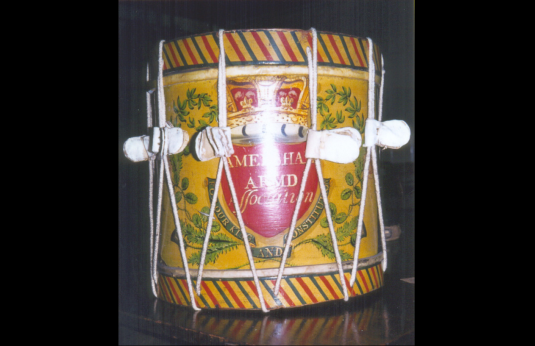Traditionally, the drum is associated with Sergeant Major William Berry, the landlord of the Griffin Inn at Amersham. Infantry volunteers had originally been formed in Bucks in response to the Defence of the Realm Act in April 1798, which permitted such offers to be made. It was reported that 50 volunteers had come forward in Amersham. Corps and associations formed in 1797 and 1798 tended to be eminently respectable in social composition such as professional men, tradesmen and artisans. Offers from those of lower social status were often turned down on the assumption that men in casual or seasonal employment should be available for the militia ballot. Most of the volunteer infantry units were disbanded or ceased to exist with the Peace of Amiens signed between Britain and France in March 1802.
When war was then renewed in May 1803, the Lord Lieutenant, the 1st Marquess of Buckingham conceived of only small bodies of volunteers should be revived and attached to the mounted yeomanry, originally formed in 1794 and which had continued to exist during the brief period of peace. However, there was a substantial response as at Aylesbury in August 1803 when those sponsoring the new Loyal Aylesbury Volunteers pledged to set aside ‘petty motives’ while the ‘Wolves of France are howling at the Doors of the English family’, thus endangering the safety of the King, the chastity of womenfolk, and property whether ‘a Palace, a House, a Cottage, or a Chest’. The Amersham Association emerged at the same time and, like the others, set its own rules and regulations. Those of the 2nd Mid Bucks Regiment included a series of fines for non-attendance and disobedience for both officers and men. They were to be recoverable through magistrates in the case of default. Thus, each offence would cost an officer 20s.0d, and a man 5s.0d. Men were able to resign, however, on three weeks’ notice. As with the yeomanry, costs were not inconsiderable. Incidental expenses for the Amersham volunteers amounted to £111.4s.2½d between January 1804 and May 1806, mostly for cleaning arms. In May 1806, it was said that its funds were exhausted. Nonetheless, it survived and was incorporated into the 1st (or Southern) Regiment of Bucks Volunteers. Subsequently, about two thirds of the regiment agreed to transfer to the new semi-balloted local militia in October 1808.
Potential recruits for the yeomanry had been enlisted at the Griffin Inn in 1794 but the meeting to explain the new force to the volunteers in 1808 was held at the Crown. Now a restaurant, the facade of the Griffin in Amersham’s Broadway dates from the 17th Century but there are Tudor features to the building’s rear. Coaches to and from London stopped daily at the Griffin during the French Revolutionary and Napoleonic Wars.
